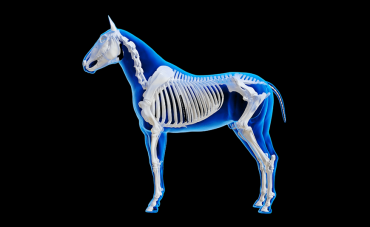Anti-inflammatory drugs are commonly used by vets to treat different conditions in horses. They help to relieve the horse from pain or inflammation. In this article, we’ll be telling you a little bit more about how these drugs work, the difference between the different types, as well as the conditions they can be used for.
What are anti-inflammatory drugs for horses?
Anti-inflammatory drugs are a class of molecules that act on inflammation. There are two main classes: steroidal and non-steroidal anti-inflammatory drugs. Steroidal drugs include corticosteroids, such as prednisolone or dexamethasone. They work in a slightly different way from non-steroidal anti-inflammatory drugs. Non-steroidal anti-inflammatory drugs (NSAIDs) are a large class of molecules with several different sub-classes: non-preferential COX inhibitors (flunixin and phenylbutazone), preferential COX-2 inhibitors (meloxicam), and selective COX-2 inhibitors (firocoxib). The nomenclature of the different sub-classes is derived from their specific mode of action on the elements producing the inflammation.
How do anti-inflammatory drugs for horses work?
Anti-inflammatory drugs act on the inflammatory cascade. They prevent the body from producing molecules known as inflammatory mediators. As explained in the article about inflammation, inflammatory mediators are responsible for spreading the inflammation, causing swelling, and also generating pain. This is why anti-inflammatory drugs act on both inflammation and pain. Non-steroidal anti-inflammatory drugs are the ones most commonly used to treat horses. They act on two enzymes that are responsible for producing inflammatory mediators: cyclooxygenases 1 and 2. The action on cyclooxygenase 2 (COX-2) is mainly responsible for the production of inflammatory mediators that lead to pain. Cyclooxygenase 1 (COX-1) is mainly responsible for the production of physiological mediators that aim to protect certain organs. Preferential COX inhibitors (flunixin and phenylbutazone) act on both enzymes (COX-1 and COX-2) equally, preferential COX-2 inhibitors (meloxicam) act slightly more on COX-2, while selective COX-2 inhibitors (firocoxib) mainly act on COX-2. Therefore, the aim is to limit the action of the COX-2 enzyme to prevent it from producing inflammatory mediators that are responsible for pain and inflammation.
Corticosteroids are used in more specific situations. They act on another enzyme responsible for the production of inflammatory mediators: phospholipase. While corticosteroids play a role in limiting inflammation, they also mitigate allergic reactions the body may have.
Why and how should anti-inflammatory drugs be used in horses?
Anti-inflammatory drugs are prescribed by a vet when they wish to control inflammation or pain in a horse. Anti-inflammatory drugs can be administered in different ways: locally as a topical application or local injection; or generally as a treatment to be swallowed or as an injection. The local route of administration only allows for the treatment of a specific area. In local treatments such as creams or gels, the active ingredient penetrates the skin to act specifically on the painful area. Generally speaking, anti-inflammatory drugs in cream form tend to be corticosteroids. The vet can also administer an anti-inflammatory drug via a local injection. The product will mainly act on the affected area. An example of this could be a joint injection, in which the vet administers a corticosteroid to relieve the horse from joint pain. The product will only act on the joint.
The general administration of anti-inflammatory drugs (oral route or via injection) allows the vet to treat the whole body, as well as areas that cannot be reached with a local treatment. Both the injectable route and the oral route introduce the molecule into the horse’s bloodstream. The active ingredient then reaches the affected areas. Injections can be administered intravenously, whereby the product is injected directly into the bloodstream through a vein. They can also be intra-muscular, whereby the product is injected into a muscle to then enter the blood. Orally administered treatments are available in the form of different types of products: they can be a powder to be mixed in with food, a liquid to be swallowed, a paste to be administered with a syringe into the mouth, or a tablet to be offered with a treat in the palm of your hand.
What conditions can be treated with anti-inflammatory drugs for horses?
Anti-inflammatory drugs can be used for a wide variety of problems in horses.
The nature of the anti-inflammatory drug used – in other words, if it’s a corticosteroid or non-steroidal – depends on the diagnosed condition.
Corticosteroids are most often used for problems involving allergies or significant swelling. One of the most common uses of corticosteroids is to treat respiratory conditions such as equine asthma (emphysema), which is caused by a respiratory allergy to microparticles in the environment such as dust, pollen, or mould.
Non-steroidal anti-inflammatory drugs can be used to treat numerous conditions in which inflammation, pain, or fever need to be controlled. The list of uses is very long, but here are some examples grouped by type:
- Orthopaedic pain that is often characterised by lameness: arthrosis, tendonitis, fractures, desmitis, sprains, laminitis, navicular syndrome, etc.
- Soft tissue pain:
Eyes: a closed eye or difficulty opening the eye that could be related to a corneal ulcer, uveitis, etc.
Digestive conditions: signs of abdominal discomfort associated with colic
Reproductive conditions: inflammation of the placenta during pregnancy in broodmares - Fever:
Bacterial infection: strangles, foal rhodococcus, Lyme disease, leptospirosis, bronchopneumonia, lung infections, abscesses, etc.
Parasitic infection: piroplasmosis, etc.
What are the risks of using anti-inflammatory drugs?
Anti-inflammatory drugs mainly have a positive effect on the body, but they can also lead to side effects that may involve several organs. This is why they must be used responsibly, always following the doses prescribed by the vet.
Some organs naturally produce inflammation that plays a physiological role. This “useful” inflammation helps to protect the organs and prevent the body from attacking itself. This is what happens, for example, in the stomach where, in case of too much acidity, physiological inflammatory mediators reduce acid production, in this way preventing stomach ulcers from forming. The enzyme responsible for the production of these physiological mediators is COX-1. It is necessary to differentiate these mediators from the inflammatory mediators that are produced by COX-2 upon trauma or shock, which are responsible for inflammation and pain.
Anti-inflammatory drugs don’t all work in the exact same way when it comes to COX-1 enzymes that are responsible for the production of physiological mediators. Some drugs, namely preferential COX-1 inhibitors, work in almost the same way on COX-1 and COX-2. Other anti-inflammatory drugs, namely COX-2-specific inhibitors, focus on COX-2, having a very weak effect on COX-1.
Side effects that can potentially occur when using non-steroidal anti-inflammatory drugs involve, among others, digestive pain related to the formation of stomach ulcers or inflammation of the digestive mucosa, particularly in the colon (colitis). Diarrhoea may also occur. Finally, some horses may present with renal disorders that could even lead to kidney failure. If a horse stops eating after receiving anti-inflammatory drugs for several days, this could be an initial sign of discomfort related to this kind of medication.
The nature and frequency of these side effects depends on the anti-inflammatory drug being used.
Some horses may have specific sensitivities. For example, a horse with stomach ulcers or digestive sensitivity is at a greater risk of developing signs of digestive discomfort after treatment with an anti-inflammatory drug, depending on the molecule in question.
Anti-inflammatory drugs are used in the context of a medical consultation with a vet. Your vet will be able to advise you on the most suitable drug for your horse.










